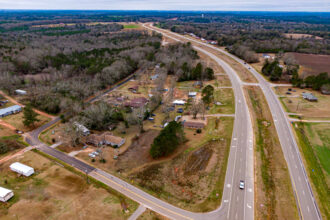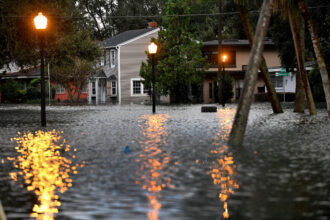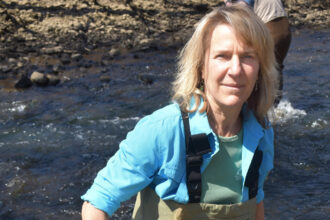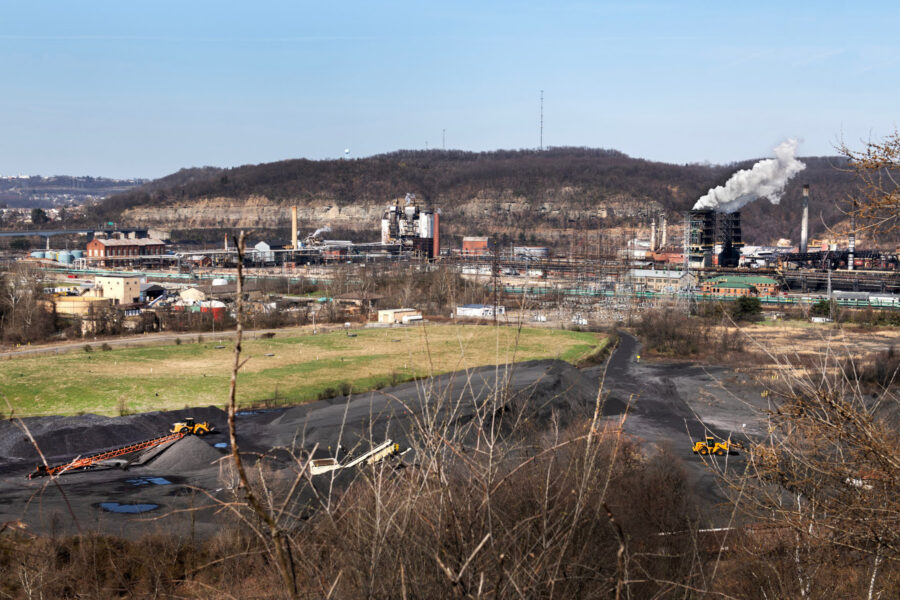BIRMINGHAM, Ala.—As federal officials continue their civil rights investigation of the Alabama Department of Transportation, a White House environmental advisor says more could be done for Black Alabamians.
Robert Bullard, a member of the White House Environmental Justice Advisory Council, traveled to Washington on Wednesday with residents from the unincorporated community of Shiloh in Coffee County to push for a more “rapid response.” Federal transportation officials, who confirmed the meeting, remained noncommittal, citing the ongoing civil rights probe, which documents show began in September 2022.
Residents of Shiloh, near Bullard’s hometown, about 170 miles south of Birmingham, have faced years of flooding after state and local transportation officials elevated a highway over the surrounding landscape, leaving drainage ditches pointed like cannons at a Black neighborhood.
Bullard has toured Shiloh again and again, each time hearing from impacted residents and documenting conditions like sinking and molding homes that he said stem from structural environmental racism. Pastor Timothy Williams and Army veteran Willie Horstead Jr., who filed a complaint before the Federal Highway Administration that led to the civil rights probe, both told Bullard that their homes have both been inundated by repeated flooding that never happened before the nearby highway was elevated above their roofs.

Bullard, Williams, and Horstead described their meeting with DOT officials as “frustrating and disappointing.”
Shiloh residents and Bullard, a professor of urban planning and environmental policy at Texas Southern University in Houston, had expected quick and decisive action from federal officials.
“We’ve been let down,” Williams said. His home is a stone’s throw from elevated Highway 84, which is now nearly level with his roof. “We’re upset,” he said.
Bullard said the acts of harm evident in Black communities like Shiloh and the Strain Road neighborhood of Athens, Alabama, about 90 miles north of Birmingham, where white homeowners enjoy municipal sewer service while many Black homeowners do not, are disasters that should receive federal action similar in scale to the response in East Palestine, Ohio, following a 2023 train derailment.
There, Biden committed millions of federal dollars to address the concerns of residents impacted by the disaster. East Palestine’s citizens deserve every penny of that funding, Bullard said, but Black Alabamians also deserve to be treated with dignity and respect in the face of what he said is another undeniable environmental emergency.
A Prayer for Proper Infrastructure
Days before his meeting in Washington, Bullard had toured the Strain Road neighborhood, where Black residents lack affordable access to the sewer system that already serves their white neighbors and runs through their yards. During that visit, Bullard watched as a local pastor prayed to God that his parishioners may someday simply have the ability to flush their toilets and have the waste leave their yards.
In the pulpit of his small church, Pastor James Jamar had asked for divine intervention in a dilemma that’s been plaguing his community for years.
Jamar’s request was simple: that his historically Black community be able to access the wastewater system the city already uses to serve its white residents.
“That’s why we come here, Lord,” Jamar prayed inside St. John Missionary Baptist Church. “Because we need the drainage system fixed. We need to be on the sewage line.”
Jamar has been praying for a fix for decades. Strain Road is a community left behind, its residents have said. As Athens and surrounding Limestone County, which includes the Huntsville suburbs, continue to outgrow the rest of the state, Jamar and other Black residents have said that the necessary investments to bring their neighborhood’s infrastructure into the 21st century simply haven’t been made.

Community members have brought their complaints to local leaders again and again, but in residents’ view, little has been done to address fundamental inequities in the way the city’s Black citizens are treated by their government.
In a statement, a city spokesperson said that Athens has contracted with Communities Unlimited, a nonprofit, to survey the community about resident concerns. After the surveys are completed, the spokesperson said, city officials will meet with state environmental officials “to discuss any next steps and potential funding.”
Those living in the neighborhood said they see no progress in addressing what are immediate health and safety risks caused by the city’s neglect. Giving Black residents affordable access to the city sewer doesn’t take a study, they said. It takes action.
So last week, with little hope in a government solution but faith in the Lord above, Jamar prayed.
“We ask you to touch hearts and touch minds so they can begin to realize what we need and how we need it,” he said. Affirming echoes filled the pews. “We know that they can do it, but Father, you may have to touch them and make them come out and do what’s supposed to be done… That’s why we’re petitioning you. That’s why we’re asking you out of the bottom of our hearts … We ask you right now in your son Jesus’ name.”
Bullard said Jamar’s prayer broke his heart.
He had traveled to Athens alongside representatives of Shiloh. Earlier in February, Bullard had toured Shiloh, where residents’ homes have been flooded by the expansion and elevation of the highway.
His visit to Athens was a fact-finding mission, Bullard said, but it was also a show of solidarity and a way for Black Alabamians facing environmental racism to combine forces in search of lasting solutions.
Horstead, 79, made the four-hour trip from Shiloh to Athens to stand with members of the Strain Road neighborhood. He knows about prayer.
Just a few weeks earlier, Horstead had been showing Bullard damage to his own mobile home, which has been sinking due to inundation from flooding. His prayer, Horstead told Bullard at the time, is that he doesn’t fall through his own floor.
On Thursday, Horstead addressed Athens residents with a message of hope and resilience.
“Don’t give up,” he told them, his voice booming through the small church. “We fight this thing together. You’re not alone. I don’t know if you ever feel like you is alone, but we is all sisters and brothers in Christ. We should hold hand in hand and fight this thing. God is on our side.”
Diane Steele, with the Limestone County NAACP, thanked Bullard and Shiloh’s representatives for coming to Athens. She told those gathered that the conditions in the Strain Road community have changed the way she sees rain. A lack of adequate stormwater infrastructure often leaves the neighborhood underwater and compounds septic issues in a community that should be served by city sewer services, she said.
“This is urgent,” Steele explained. “When you cannot flush your commode, when you have backup coming in your toilet, that’s urgent.”
Steele said that in the absence of action by local leaders, she’s happy to see folks willing to stand side by side with communities facing similar issues in other parts of the state.
“Anything you can do to shine a light on this, we say thank you,” she told those gathered.
Inadequate stormwater and sanitation infrastructure has left many Americans struggling to live their day-to-day lives. More than two million people in the United States live without adequate wastewater infrastructure and access to safe and reliable drinking water in their homes, according to the federal government.

Many Alabamians, including some residents in the Strain Road neighborhood, only have access to straight piping, a system in which untreated wastewater is simply released from a home into the ground due to lack of access to a sewage system or septic tank. For those in the neighborhood who do have a septic tank, heavy rain and a lack of stormwater drainage can increase the frequency of pumping needed to maintain the system, costs that residents often can’t afford to pay.
Catherine Coleman Flowers, a prominent Alabama environmentalist, has long advocated for adequate wastewater infrastructure in Alabama. Flowers, who like Bullard serves on Biden’s Environmental Justice Advisory Council, said that situations like the one in Athens cast doubt on Alabama’s stated “pro-life” values.
“This is just another example of the structural inequalities that we need to change,” Flowers said. “Failed policies and flawed infrastructure should not be acceptable based on the income or race of the impacted community. We should use every means available to make certain that the human rights recently expanded to embryos in the state are also enjoyed by all residents of Alabama.”
Finding a Way Forward
Bullard said that the situations in Shiloh and Athens share a commonality—the willingness of local and state officials to neglect Black communities.
“In Shiloh, they turned the drains on the community like cannons shooting water—saying ‘I disrespect you. Move or die or drown,’” he said.
Bullard said visits like the one to Athens aren’t just symbolic. Discussions about possible solutions can start to connect the dots for communities who want to access federal funding available through legislation like the Bipartisan Infrastructure Law and the Inflation Reduction Act.
During his trip to Athens, Bullard and others began engaging with community leaders on the logistics of applying for—and effectively implementing—federal dollars, something Bullard said could be key to leveling the playing field for Black citizens’ access to adequate infrastructure.
To that end, Bullard has established a namesake center at Texas Southern University that will serve as a conduit for $50 million in federal funds earmarked for local nonprofits. The Bullard Center for Environmental and Climate Justice is one of 11 such organizations the Biden administration has created nationally to distribute a total of $600 million in environmental justice funding.
“Here’s a textbook example of where federal money can be applied,” Bullard said of the Strain Road community’s infrastructure woes. “There’s been a legacy of neglect.”
“When you flush your toilet, you expect the waste to go and disappear. That right has been taken away from these people.”
Bullard sees his job as multifaceted, bringing residents’ concerns to top officials while also working to expand access to often complex federal funding opportunities by developing meaningful working relationships with residents on the ground.
“The model is grassroots,” he said. “It’s educating people and institutions as to how they can work together and pull together. The more organized they are, the better chance they have to get access to these resources. We say that this is your money, and this is your time.”
But the conditions on the ground motivate Bullard to do more, quicker.
“When you flush your toilet, you expect the waste to go and disappear,” Bullard said. “That right has been taken away from these people. There are so many basic things that are wrong with this picture. This isn’t right, and it needs to be corrected.”
And it shouldn’t take another election cycle to get it done, Bullard added.
“It shouldn’t be four more years or eight more years,” he said. “It needs to be corrected now because there’s resources available now to do it.”
In Shiloh, Pastor Williams said Bullard’s help and expressions of support have made him hopeful for the first time in a long time. It’s why he agreed to travel with Bullard to Athens: to give those in the Strain Road community the same hope Bullard has given him.
“I believe it gave them hope,” Williams said. “They know they can keep pushing on. Help is coming.”
From Investigation to Action
Since the meeting with DOT officials, though, Bullard said he is much less confident that a strong federal response comparable to that in East Palestine will come to Alabama’s suffering Black communities.
“I’m not trying to compare misery, but it’s pretty clear—night and day—that these two communities have been treated differently,” he said. “The responses have been different. And we say that should not be the case.”
A spokesperson for the U.S. Department of Transportation said that during the meeting with Bullard and Shiloh representatives, officials heard “deeply moving testimony about the experience of residents and concerning allegations of improper conduct by state and local authorities and stakeholders.”

DOT officials committed to visiting Shiloh and providing “technical assistance to Shiloh and other communities experiencing environmental justice issues to identify and access federal resources that could help the community.”
Department officials said the ongoing civil rights investigation is examining whether state officials violated the civil rights of residents by withholding flood assistance based on race.
In a letter dated September 2022, an official with the Federal Highway Administration wrote to Horstead and Williams accepting their complaint against state and county officials and initiating an investigation into “whether the Alabama Department of Transportation and Coffee County violated Title VI by not resolving the flooding issues impacting the community residing between US Highway 84 and County Road 502.”
According to the letter, the complaint was assigned to a coordinator in the Federal Highway Administration for investigation.
A department spokesperson said that U.S. DOT could not provide additional details about its investigation into the Alabama Department of Transportation or other entities.
“DOT cannot comment on the specifics of the ongoing investigation but will use its authority to ensure any necessary corrective actions are taken based on the results of the investigation.” the agency spokesperson said.
The Alabama Department of Transportation has not responded to repeated requests for comment.
Bullard and Williams said they felt as though DOT officials may use the existence of the investigation as an excuse not to act swiftly in addressing the immediate needs of the community. Bullard said he and the residents of Shiloh don’t want department officials to take any actions that would interfere with the ongoing investigation. Instead, he’d like federal agencies to do their jobs to facilitate help for communities suffering from the ongoing effects of environmental racism.

Williams and Horstead filed a civil rights complaint as one way of seeking much-needed help for their community, Bullard said, and using every avenue to protect their rights shouldn’t work against Black residents.
“Just because communities file a complaint, they should not be penalized,” he said.
Williams said the investigation has already taken over a year, and residents in Shiloh shouldn’t have to wait for help when the problems are clear and have been for years.
According to DOT documents, Title VI civil rights investigations have no set time limit, but the agency “strives to complete all tasks within 180 days from the date of acceptance.” It’s now been more than 535 days since Shiloh’s complaint was accepted.
Federal agencies have a history of using civil rights investigations to force action by state officials in Alabama and beyond, sometimes to significant effect.
In May 2023, an 18-month investigation by the EPA and the Department of Health and Human Services’ Office for Civil Rights led to the Alabama Department of Public Health committing to improving access to wastewater systems in Lowndes County.
This story is funded by readers like you.
Our nonprofit newsroom provides award-winning climate coverage free of charge and advertising. We rely on donations from readers like you to keep going. Please donate now to support our work.
Donate NowBullard said DOT officials also suggested the idea of having him and others help document similar cases of environmental racism across Alabama and beyond to prevent “future Shilohs.” Bullard said he applauds that effort and will do what he can to help. But doing so shouldn’t be to the exclusion of getting something done on the ground in Shiloh now, he said.
He is eyeing Vice President Kamala Harris’ March 3 visit to Selma, to participate in an annual pilgrimage to the Edmund Pettus Bridge, the site of Bloody Sunday, where Alabama State Troopers beat protestors including John Lewis in an act of racial violence.
Bullard and Williams said that during her trip down south, Harris should visit Shiloh, too.
“This is a great opportunity for the vice president to see and learn and listen,” Bullard said. Getting public officials to see with their own eyes what’s happening on the ground is the key to spurring action, Bullard said. And what is needed now, he said, is the immediate application of federal effort and dollars to help communities like Shiloh and Strain Road.
“It’s as if it’s falling on deaf ears in terms of the urgency,” Bullard said. “But this is an emergency.”













